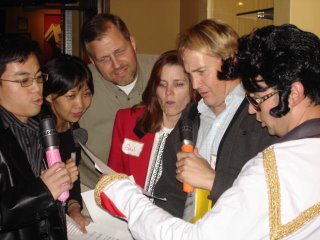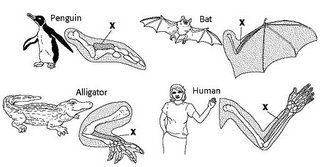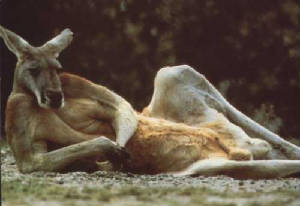Ever since Malcom Gladwell first endorsed
The Wages of Wins in the New Yorker last summer, Dave Berri’s secular science of Iverson-bashing has been subject to an endless stream of criticism from pro basketball’s actuarial heavyweights. ESPN’s
John Hollinger , Salon’s
King Kauffman , and APBR’s
Dan Rosenbaum have all traded blows with Berri and his co-authors, leading Dan Shanoff to
name Wages of Wins the most controversial sports book of 2006. In many ways, the volume of criticism directed at
Wages testifies to the durability of its thesis. Everyone seems to agree that the book is flawed, but no one can definitively say why. The reason for the stalemate, I believe, is a confusion over the nature of the flaw. The problem with
Wages isn’t the statistics – its the economics from which they derive.

As Mathew Yglesias has
wisely noted , the central issue in
Wages is the weak correlation between payrolls and wins. Numerous empirical studies have demonstrated that increases in NBA payrolls do not correspond to increases in team success. Given that player salaries are determined by conventional measures of productivity – in particular, scoring – Berri argues that these measures must be flawed: otherwise, higher payrolls would mean greater productivity, and by extension, wins. The aim of
Wages, then, is to develop a more accurate model of player productivity – one which could, if adopted by GMs, eliminate the disjunction between wages and wins, and thereby usher in a more economically efficient league.
I won’t go into detail about
Wages’ methods, which are well summarized
here . The basic idea is to use regression analysis to estimate a single measure of players’ marginal productivity, called ‘Win Score’ (WS). The crucial difference between Win Score and existing metrics (like PER) concerns the valuation of scoring. Unlike conventional measures of offensive efficiency, which penalize players only for the shots that they miss, Berri recognizes that even when a shot is made, a resource – a possession – has been expended. Because teams average roughly 1 point per possession, a 1pt opportunity cost is deducted for each field goal attempt, regardless of whether it goes through the hoop. Thus, when Kobe Bryant shoots 26-50 for 52pts, his marginal impact on team wins (52pts – 50pos = +2) is the same as that of Ronny Turiaf shooting 2-2 for 4pts (4pts – 2pos = +2), or Andrew Bynum grabbing 2 defensive rebounds (2pos = +2).

Now, the economics. Suppose that Berri is basically correct, and that Win Score is an accurate measure of players’ marginal productivity. According to orthodox economic theory, the “price” (i.e. wage) that players receive in an efficient market should be determined by their Win Score. However, recent economic models have demonstrated that the existence of this “efficient market”, and its capacity to correctly “price” player inputs, depends on a highly unrealistic assumption: namely, perfect information. For a GM to sign a player on the basis of his Win Score, he must first
know, with relative certainty, what a player’s Win Score will be.
In his book, Berri argues that player productivity can be predicted, with sufficient certainty, on the basis of past performance. Using data from 1994-2004, he shows that Win Scores from the previous season are highly correlated with current performance (R-sq = .70). The problem with this line of reasoning is that “Win Score” as such doesn’t actually exist, but is instead a composite of various inputs. Now, suppose we distinguish between
scoring input (points – true shot attempts), and
non-scoring input (rebounds + steals - turnovers….). When we reexamine Berri’s 1994-2004 data, we find that non-scoring production is almost perfectly consistent from year to year (R-sq = .85). Yet when we consider scoring production alone, the correlation between past and current performance is much, much weaker (R-sq = .30). Thus, contrary to the assumptions of Berri’s economic model, the ability of GMs to accurately “price” a players’ scoring production is a highly uncertain (i.e. risky) business. From the perspective of players, the risk involved in scoring production appears even starker. Except for super-efficient producers (i.e. Shaq or Duncan), even above-average career shooters face a significant risk of ending a given season with
negative scoring production, and thus, scoring
income. Berri’s data shows that in any two season interval, over 30% of all players switch between positive and negative scoring Win Scores.
The uncertainty of point production has profound implications for Berri’s analysis. Under the assumption of perfect information, efficient scorers
know whether they will shoot efficiently each season, and thus will
continue to shoot up to the point where it becomes unproductive for the team. In reality, however, players are uncertain as to their actual scoring efficiency, and as such will be risk-averse when attempting to maximize that aspect of their income. Thus, if scorers were to be paid the true value of their marginal products – if economic rewards were distributed on the basis of Win Score – there would emerge a profound divergence in what teams and players perceive as an optimal level of shot attempts. Insofar as their investment is ‘diversified’ across the entire roster, teams will prefer that the above-average scorer shoot liberally, despite the occasional below-average season. In contrast, the player, fearing the possibility of a sudden career-ending injury, and thus relatively more risk-averse than his employer, would likely under-invest in shot attempts – if not eschew scoring altogether – rather than risk a negative scoring year.

The problem of underinvestment is further compounded once we consider that players themselves can, at any given moment,
choose between scoring (risky) and non-scoring (risk-less) production. Thus, rather than take a high-percentage field-goal attempt, a player may opt for a potential assist (WS = +.5), or focus on grabbing an offensive rebound (WS = +1). The problem here is analogous to the one identified by economist Joseph Stiglitz in his analysis of the sharecropping system. Stiglitz argues that in situations where workers can choose between more- and less-risky farming techniques, there will arise
“a conflict of interest between the landlord and workers. At any specified share contract, the landlord wants only to have the worker choose whatever technique or crop maximizes expected output; the worker is willing at the margin to sacrifice some mean output for a reduction of risk”. For above-average scorers, shooting will generate more overall career utility than, say, offensive rebounding. Yet offensive rebounding may nevertheless be more attractive since it poses essentially no risk of a loss. If scoring was “priced” on the basis of Win Score, even the most efficient shooters would likely under-produce on offense, choosing instead to maximize other, less-risky forms of production.
Berri and Co. are certainly correct in their claim that scorers are overpaid relative to their marginal impact on team wins. Yet in their rush to offer a correction, the authors never fully consider why this is the case?
Why is it that scoring statistics explain 63% of player salaries, while equally-important possession statistics (i.e. rebounding) combine to explain just 1%? To the extent they address these questions, Berri and his co-authors fall back on an unconvincing appeal to the “bounded rationality” of GMs. They argue that the “myth” of scoring’s importance has only survived because people in the NBA do not process information efficiently, and that once they are exposed “to new and better information”, their decisions will change accordingly. In other words, the reason mangers overpay for scorers is that they haven’t read
Wages of Wins!
The recognition that scoring is a uniquely risky mode of production, and that determining its “price” is fraught with uncertainty, affords a far more convincing explanation of its disproportionate value and compensation. What first appears as irrational, suboptimal behavior under the orthodox assumptions of neoclassical economics can now be understood as economically rational (if not perfectly efficient) outcomes in situations of uncertainty. Consider the question of why scoring is valued more than possession statistics, even though their marginal effect on wins is the same. Traditional economics tells us that in equilibrium, the price of labor depends on its quality (i.e. marginal productivity): if scoring and rebounding are equally productive activities, their prices should be equivalent. In contrast, Stiglitz and other economists have shown that in situations of uncertainty,
quality often depends on price: here, workers with a certain labor
capacity will only expend the necessary effort if they are paid an above-market wage. Put simply, the production of points in the NBA – due to the relative uncertainty of success – requires that scorers receive more than the value of their marginal product. Otherwise, players with the capacity to shoot efficiently WOULDN’T TAKE THE RISK OF TRYING TO SCORE.

By way of conclusion, let me just say that there is something peculiar about three academic economists second-guessing the propriety of NBA salaries. Well-paid professionals of all other persuasions are rarely subjected to such skepticism. Asked to account for the exorbitance of CEO compensation, for example, and your average economist will more likely cut off his own arm than conclude it anything other than optimally wealth-enhancing. Compared to CEOs, one would think that high-scoring basketball players – whose performance is subject of infinitely more surveillance, and who negotiate their contracts with infinitely less bargaining power – would be worthy of
at least the same benefit of the doubt. Yet Berri and Co. simply jump to the conclusion that these players are overpaid.
The reason, it seems to me, is that below its ostensibly neutral surface,
Wages of Wins is as much ideology as science. Note the familiarity of Berri's targets (Melo, AI), his conspicuous affection for "Playing the 'Right Way'" (see Chapter 10), or the undisguised moralism of the title’s
jeu de mots. Or consider the following from the authors'
blog :
Certainly NBA coaches, like Auerbach, are aware that rebounds, shooting efficiency, and taking care of the ball are important. But players can see that the highest paid are the scorers. And players also see that the money still comes even if they perform poorly with respect to many of the other parts of the game Auerbach knew led to wins and championships. So next time you see a player focus more on how many touches he has and less on winning, remember the incentives the players face. And ask yourself, what would you rather do, collect millions or win a basketball game?The irony of this passage is that it recognizes (albeit tacitly) that the quality of scoring production is a function of its above-market “price”. Yet rather than exploring the obvious conclusion – that such incentives are
necessary for motivating scorers’ labor – the authors instead retreat to the well-trodden canard of player selfishness. What we have in Berri’s book, then, is Calvinism masquerading as social science – not the other way around.








